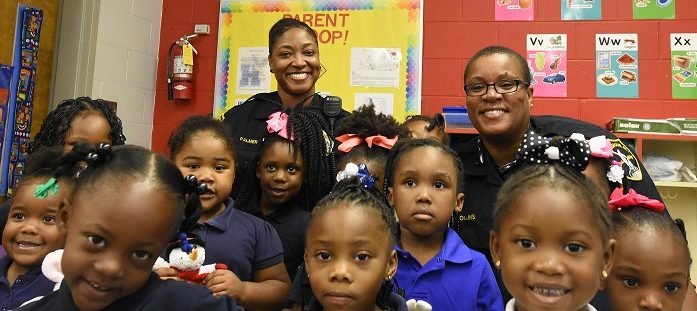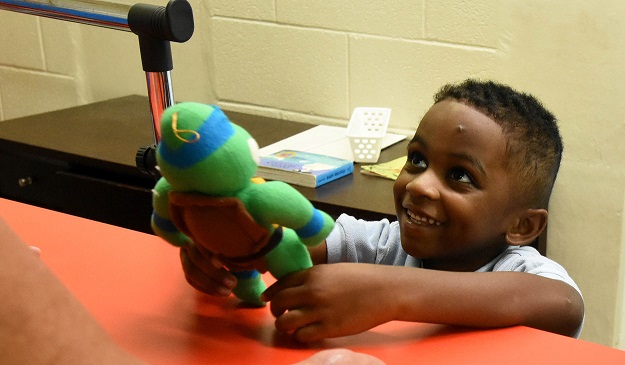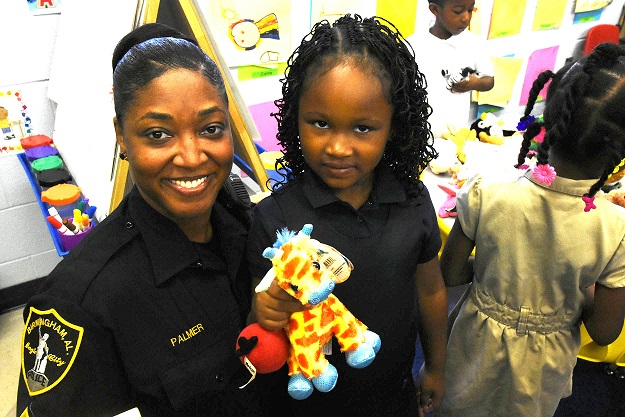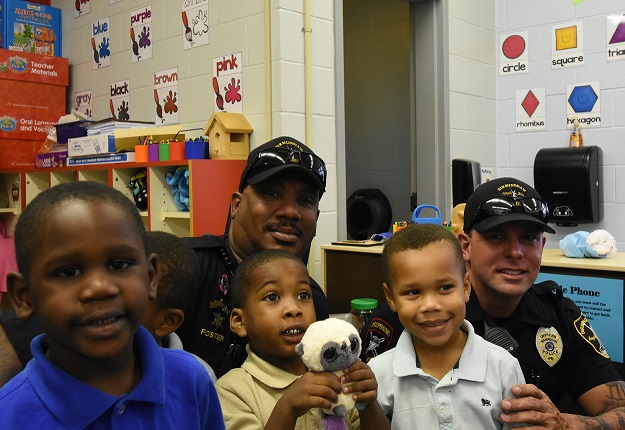
By Ariel Worthy and Monique Jones
The Birmingham Times

Birmingham’s community policing program could be a model for the rest of the nation, where clashes between residents and law enforcement in some areas have led to fatalities. The hostilities followed an explosive succession this year of high-profile police involved killings—including both unarmed African-American men and law-enforcement officers.
“Community policing is part of our basic operating philosophy. The bottom line is that community policing is critically important for any type of crime-reduction efforts,” said Birmingham Police Chief A.C. Roper in an interview with The Birmingham Times. “We can’t be everywhere. We need the community to be our eyes and ears. These are challenging times across the nation in regards to race and policing. It’s important to have deep conversations so that we can all gain a mutual understanding.”
Race and Policing
The Birmingham Police Department (BPD) is part of a select group of pilot cities participating in the National Initiative for Building Community Trust and Justice. This initiative, spearheaded by the U.S. Department of Justice, is a three-year program aimed at offering solutions to policing’s current problems.
“We raised our hand and said, ‘We want to be a part of this,’” said Roper during the “Race and Policing in America” panel discussion at Alabama National Association for the Advancement of Colored People (NAACP) 64th Annual Convention, held in Birmingham last month. “How can we help improve policing across America?”
The BPD is in its second year of the program. This phase involves hours of new training, including 16 hours of procedural justice training.
“[It involves] how to talk to people, how to be trustworthy [to the community] … how to be neutral in decision-making, how to show respect,” Roper said.
Other training will include implicit bias recognition.
“We all have biases that we aren’t aware of, and we’ve got to learn how to identify those biases,” he said. “All of our officers will be going through the training in January, at which time each of us will identify our personal biases.”
The training will help officers realize their own biases, Roper added, as well as give them the tools to counteract said biases while on the job.
Hostility between law enforcement and some areas of the community have been well documented. As of Oct. 29, 2016, 793 people have been killed in police-involved shootings and 47 officers have been slain in the line of duty nationwide, according to a report from the Washington Post and the Officer Down Memorial Page.

Weed and Seed
The BPD has made a conscious effort to build relationships with the communities it serves.
“For us, it’s building relationships and instilling trust between the law enforcement and the community,” said Andrea’ Watson, executive director of the Birmingham Community Policing and Revitalization Division (CPR), who notes that the city’s officers participate in a variety of programs.
Through Cops We Care, a partnership between the Birmingham Mayor’s Office and the CPR, officers deliver stuffed animals to children citywide, such as K4, K5, and first graders at West End’s Hemphill Elementary School.
The Birmingham Weed and Seed Task Force, is designed to “go into various communities; weed out the bad elements of crimes, gangs, drugs, and violence; and seed new programs and services into the area,” Watson said.
The Citizens Police Academy (CPA) Volunteer Program offers classes that familiarize residents with the nature of police work so they better understand how the BPD operates. The classes, offered twice a year, focus on various areas of the police department, such as narcotics, homicide, gun ranges, driving ranges, and tactics.
“One night, [attendees] visit the Birmingham City Jail. One Saturday, they visit the tactical unit to see how the bomb squad works. Another Saturday, they go to the driving range, ride in the cars, and do the simulation of shooting a gun,” Watson said.
Similar classes are offered to teens between the ages of 13 and 17 as part of the Youth Citizen Police Academy.
“About 50 students see firsthand how the police department works in certain areas, including burglary, robbery, and internal affairs, so they understand their rights,” Watson said.

Community Concerns
Despite the best efforts by Birmingham and other jurisdictions, some still have concerns about policing throughout the area and across the U.S. During a recent forum on community policing at the Birmingham Public Library, Jeannen Whatley-Hill of North Birmingham wanted to know more about training for police after they graduate from the academy.
“When you have soldiers overseas defending us, they can’t just shoot people. When the FBI goes out, they can’t just shoot people,” Hill said. “What is the plan to address police officer training to deescalate a situation not just Birmingham but across Alabama?”
Roper, who was a member of the panel, explained, “The state of Alabama mandates 13 weeks of academy training for every new officer. In Birmingham, we require our officers to do 21 weeks of training every year. In fact, we train in the spring and the fall. They go over policies for batons, spray, and Tasers every year. We train a lot.”
Lyord Watson of Watson Philanthropic Solutions asked about training manuals: “Who writes the training manuals, and how do you address biases in the creation of the training manuals?”
Another panelist, Bessemer Police Chief Nathaniel Rutledge Jr., responded: “The departments themselves write them. Through the years, we take what we have and build on it. Some things used to be a major focus but aren’t anymore because times have changed.”
One woman in the audience said her children are afraid of police. Rutledge shared her concern.
“Just because we’re in law enforcement, we don’t get to ignore [the issues],” he said. “My son turned 16, and we had a talk about how to respond when you’re pulled over. This is from his dad, a police officer.”
Another attendee asked about the stress related to being a police officer: “In every profession, people suffer burn out. What are you doing for the personal mental health for officers?”
Roper said, “We have a team working on a comprehensive wellness program for our officers that offers an employee assistance program for counseling. Also, in Birmingham each new officer has to undergo a psychiatric and psychological evaluation that involves both passing a test and being interviewed by a psychologist.”
Still, some were not satisfied with what they heard.
“Most answers were politically correct,” said attendee Carlos Chaverst. “When they were asked about pressing issues with community relations and transparency, the best they could come up with is ‘Looking into it.’ It’s time to move forward with transparency and accountability from our law enforcement.”

Playbook for Policing
Though Roper is pleased with the direction of his department, he meets regularly with different segments of the community to ensure that he understands concerns from residents.
“Right now, we’re having listening sessions with our African-American community leaders and community members,” he said. “I’ve also sat down with our LGBTQI community, as well as our youth and youth leaders. We’re trying to develop strategies on how we can be a better police department because sometimes we don’t get it right. I’m wise enough to know that just because someone doesn’t complain doesn’t mean there’s not a problem. It may mean they don’t trust us to solve it.”
As one of the six pilot cities in the National Initiative for Building Community Trust and Justice initiative, the BPD is undergoing training different from other departments across the country. The end goal is to develop a “national playbook for policing” created by the U.S. Department of Justice based on the research gathered throughout the program, Roper said.
“I think we’ve got to improve policing across the nation,” he said. “I don’t care how we get there, we’ve just got to get there the right way.”



